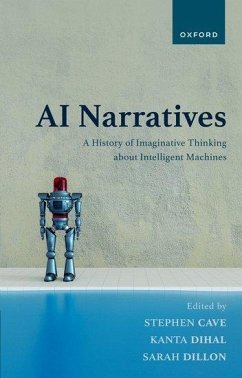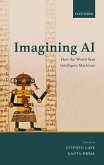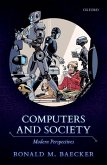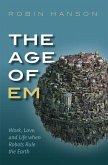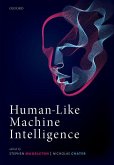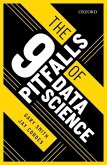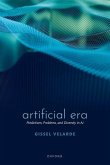AI Narratives
A History of Imaginative Thinking about Intelligent Machines
Herausgeber: Cave, Stephen; Dillon, Sarah; Dihal, Kanta
AI Narratives
A History of Imaginative Thinking about Intelligent Machines
Herausgeber: Cave, Stephen; Dillon, Sarah; Dihal, Kanta
- Broschiertes Buch
- Merkliste
- Auf die Merkliste
- Bewerten Bewerten
- Teilen
- Produkt teilen
- Produkterinnerung
- Produkterinnerung
This book is the first to examine the history of imaginative thinking about intelligent machines, featuring contributions from leading humanities and social science scholars who detail the narratives about artificial intelligence (AI) that in turn offer a crucial epistemic site for exploring contemporary debates about these powerful technologies.
Andere Kunden interessierten sich auch für
![Imagining AI Imagining AI]() Imagining AI98,99 €
Imagining AI98,99 €![Computers and Society Computers and Society]() Ronald M. Baecker (Emeritus Emeritus Professor of Computer ScienceComputers and Society163,99 €
Ronald M. Baecker (Emeritus Emeritus Professor of Computer ScienceComputers and Society163,99 €![The Age of Em The Age of Em]() Robin Hanson (Associate Professor Associate Professor of EconomicsThe Age of Em15,99 €
Robin Hanson (Associate Professor Associate Professor of EconomicsThe Age of Em15,99 €![Human-Like Machine Intelligence Human-Like Machine Intelligence]() Human-Like Machine Intelligence117,99 €
Human-Like Machine Intelligence117,99 €![The 9 Pitfalls of Data Science The 9 Pitfalls of Data Science]() Gary Smith (Fletcher Jones P Fletcher Jones Professor of EconomicsThe 9 Pitfalls of Data Science51,99 €
Gary Smith (Fletcher Jones P Fletcher Jones Professor of EconomicsThe 9 Pitfalls of Data Science51,99 €![Artificial Era Artificial Era]() Gissel Velarde (Docent in Art Professor of Artificial IntelligenceArtificial Era41,99 €
Gissel Velarde (Docent in Art Professor of Artificial IntelligenceArtificial Era41,99 €![Human-Centered AI Human-Centered AI]() Human-Centered AI126,99 €
Human-Centered AI126,99 €-
-
-
This book is the first to examine the history of imaginative thinking about intelligent machines, featuring contributions from leading humanities and social science scholars who detail the narratives about artificial intelligence (AI) that in turn offer a crucial epistemic site for exploring contemporary debates about these powerful technologies.
Hinweis: Dieser Artikel kann nur an eine deutsche Lieferadresse ausgeliefert werden.
Hinweis: Dieser Artikel kann nur an eine deutsche Lieferadresse ausgeliefert werden.
Produktdetails
- Produktdetails
- Verlag: Oxford University Press
- Seitenzahl: 448
- Erscheinungstermin: 24. September 2024
- Englisch
- Abmessung: 213mm x 135mm x 24mm
- Gewicht: 606g
- ISBN-13: 9780198914709
- ISBN-10: 0198914709
- Artikelnr.: 69963621
- Herstellerkennzeichnung
- Libri GmbH
- Europaallee 1
- 36244 Bad Hersfeld
- gpsr@libri.de
- Verlag: Oxford University Press
- Seitenzahl: 448
- Erscheinungstermin: 24. September 2024
- Englisch
- Abmessung: 213mm x 135mm x 24mm
- Gewicht: 606g
- ISBN-13: 9780198914709
- ISBN-10: 0198914709
- Artikelnr.: 69963621
- Herstellerkennzeichnung
- Libri GmbH
- Europaallee 1
- 36244 Bad Hersfeld
- gpsr@libri.de
Stephen Cave Dr Stephen Cave is Director of the Leverhulme Centre for the Future of Intelligence, Senior Research Associate in the Faculty of Philosophy, and Fellow of Hughes Hall, all at the University of Cambridge. After earning a PhD in philosophy from Cambridge, he joined the British Foreign Office, where he spent ten years as a policy advisor and diplomat, before returning to academia. His research interests currently focus on the nature, portrayal and governance of AI. Kanta Dihal Dr Kanta Dihal is a postdoctoral researcher at the Leverhulme Centre for the Future of Intelligence, University of Cambridge. She is the Principal Investigator on the Global AI Narratives project, and the Project Development Lead on Decolonizing AI. In her research, she explores how fictional and nonfictional stories shape the development and public understanding of artificial intelligence. Kanta's work intersects the fields of science communication, literature and science, and science fiction. She is currently working on two monographs: Stories in Superposition, based on her DPhil thesis, and AI: A Mythology, with Stephen Cave. Sarah Dillon Professor Sarah Dillon is University Lecturer in Literature and Film in the Faculty of English, University of Cambridge. Her books include The Palimpsest: Literature, Criticism, Theory (2007), Deconstruction, Feminism, Film (2018), and Listen: Narrative Evidence and Public Reasoning (2020, co-authored with Claire Craig). She is the General Editor of the series Gylphi Contemporary Writers: Critical Essays, and editor of two volumes in the series: David Mitchell: Critical Essays (2011), and Maggie Gee: Critical Essays (2015, co-ed). Dr Dillon was a 2013 BBC Radio 3/Arts and Humanities Research Council New Generation Thinker and regularly broadcasts on BBC Radio 3 and BBC Radio 4.
* PART I - ANTIQUITY TO MODERNITY
* 1: Genevieve Liveley and Sam Thomas: Homer's Intelligent Machines: AI
in Antiquity
* 2: E. R. Truitt: Demons and Devices: Artificial and Augmented
Intelligence before AI
* 3: Minsoo Kang and Ben Halliburton: The Android of Albertus Magnus: A
Legend of Artificial Being
* 4: Kevin LaGrandeur: Artificial Slaves in the Renaissance and the
Dangers of Independent Innovation
* 5: Julie Park: Making the Machine Speak: Hearing Artificial Voices in
the Eighteenth Century
* 6: Megan Ward: Victorian Fictions of Computational Creativity
* 7: Paul March-Russell: Machines Like Us? Modernism and the Question
of the Robot
* PART II - MODERN AND CONTEMPORARY
* 8: Kanta Dihal: Enslaved Minds: Artificial Intelligence, Slavery, and
Revolt
* 9: Will Slocombe: Machine Visions: Artificial Intelligence, Society,
and Control
* 10: Graham Matthews: "A push-button type of thinking": Automation,
Cybernetics, and AI in Mid-century British Literature
* 11: Beth Singler: Artificial Intelligence and the Parent/Child
Narrative
* 12: Anna McFarlane: AI and Cyberpunk Networks
* 13: Stephen Cave: AI: Artificial Immortality and Narratives of
Mind-Uploading
* 14: Sarah Dillon and Michael Dillon: Artificial Intelligence and the
Sovereign-Governance Game
* 15: Kate Devlin and Olivia Belton: The Measure of a Woman: Fembots,
Fact and Fiction
* 16: Gabriel Recchia: The Fall and Rise of AI: Investigating AI
Narratives with Computational Methods
* 1: Genevieve Liveley and Sam Thomas: Homer's Intelligent Machines: AI
in Antiquity
* 2: E. R. Truitt: Demons and Devices: Artificial and Augmented
Intelligence before AI
* 3: Minsoo Kang and Ben Halliburton: The Android of Albertus Magnus: A
Legend of Artificial Being
* 4: Kevin LaGrandeur: Artificial Slaves in the Renaissance and the
Dangers of Independent Innovation
* 5: Julie Park: Making the Machine Speak: Hearing Artificial Voices in
the Eighteenth Century
* 6: Megan Ward: Victorian Fictions of Computational Creativity
* 7: Paul March-Russell: Machines Like Us? Modernism and the Question
of the Robot
* PART II - MODERN AND CONTEMPORARY
* 8: Kanta Dihal: Enslaved Minds: Artificial Intelligence, Slavery, and
Revolt
* 9: Will Slocombe: Machine Visions: Artificial Intelligence, Society,
and Control
* 10: Graham Matthews: "A push-button type of thinking": Automation,
Cybernetics, and AI in Mid-century British Literature
* 11: Beth Singler: Artificial Intelligence and the Parent/Child
Narrative
* 12: Anna McFarlane: AI and Cyberpunk Networks
* 13: Stephen Cave: AI: Artificial Immortality and Narratives of
Mind-Uploading
* 14: Sarah Dillon and Michael Dillon: Artificial Intelligence and the
Sovereign-Governance Game
* 15: Kate Devlin and Olivia Belton: The Measure of a Woman: Fembots,
Fact and Fiction
* 16: Gabriel Recchia: The Fall and Rise of AI: Investigating AI
Narratives with Computational Methods
* PART I - ANTIQUITY TO MODERNITY
* 1: Genevieve Liveley and Sam Thomas: Homer's Intelligent Machines: AI
in Antiquity
* 2: E. R. Truitt: Demons and Devices: Artificial and Augmented
Intelligence before AI
* 3: Minsoo Kang and Ben Halliburton: The Android of Albertus Magnus: A
Legend of Artificial Being
* 4: Kevin LaGrandeur: Artificial Slaves in the Renaissance and the
Dangers of Independent Innovation
* 5: Julie Park: Making the Machine Speak: Hearing Artificial Voices in
the Eighteenth Century
* 6: Megan Ward: Victorian Fictions of Computational Creativity
* 7: Paul March-Russell: Machines Like Us? Modernism and the Question
of the Robot
* PART II - MODERN AND CONTEMPORARY
* 8: Kanta Dihal: Enslaved Minds: Artificial Intelligence, Slavery, and
Revolt
* 9: Will Slocombe: Machine Visions: Artificial Intelligence, Society,
and Control
* 10: Graham Matthews: "A push-button type of thinking": Automation,
Cybernetics, and AI in Mid-century British Literature
* 11: Beth Singler: Artificial Intelligence and the Parent/Child
Narrative
* 12: Anna McFarlane: AI and Cyberpunk Networks
* 13: Stephen Cave: AI: Artificial Immortality and Narratives of
Mind-Uploading
* 14: Sarah Dillon and Michael Dillon: Artificial Intelligence and the
Sovereign-Governance Game
* 15: Kate Devlin and Olivia Belton: The Measure of a Woman: Fembots,
Fact and Fiction
* 16: Gabriel Recchia: The Fall and Rise of AI: Investigating AI
Narratives with Computational Methods
* 1: Genevieve Liveley and Sam Thomas: Homer's Intelligent Machines: AI
in Antiquity
* 2: E. R. Truitt: Demons and Devices: Artificial and Augmented
Intelligence before AI
* 3: Minsoo Kang and Ben Halliburton: The Android of Albertus Magnus: A
Legend of Artificial Being
* 4: Kevin LaGrandeur: Artificial Slaves in the Renaissance and the
Dangers of Independent Innovation
* 5: Julie Park: Making the Machine Speak: Hearing Artificial Voices in
the Eighteenth Century
* 6: Megan Ward: Victorian Fictions of Computational Creativity
* 7: Paul March-Russell: Machines Like Us? Modernism and the Question
of the Robot
* PART II - MODERN AND CONTEMPORARY
* 8: Kanta Dihal: Enslaved Minds: Artificial Intelligence, Slavery, and
Revolt
* 9: Will Slocombe: Machine Visions: Artificial Intelligence, Society,
and Control
* 10: Graham Matthews: "A push-button type of thinking": Automation,
Cybernetics, and AI in Mid-century British Literature
* 11: Beth Singler: Artificial Intelligence and the Parent/Child
Narrative
* 12: Anna McFarlane: AI and Cyberpunk Networks
* 13: Stephen Cave: AI: Artificial Immortality and Narratives of
Mind-Uploading
* 14: Sarah Dillon and Michael Dillon: Artificial Intelligence and the
Sovereign-Governance Game
* 15: Kate Devlin and Olivia Belton: The Measure of a Woman: Fembots,
Fact and Fiction
* 16: Gabriel Recchia: The Fall and Rise of AI: Investigating AI
Narratives with Computational Methods

